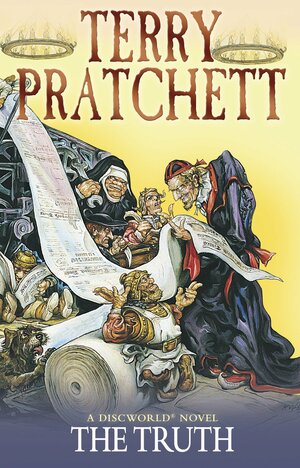
This is part of the Pratchett Project.
The blurb:
William just wants to get at the truth. Unfortunately, everyone else wants to get at William. And it's only the third edition.
William de Worde is the accidental editor of the Discworld's first newspaper. Now he must cope with the traditional perils of a journalist's life people who want him dead, a recovering vampire with a suicidal fascination for flash photography, some more people who want him dead in a different way and, worst of all, the man who keeps begging him to publish pictures of his humorously shaped potatoes.
Moving on from the Watch series wasn't easy — I'm pretty sure it's going to go down as my favourite sub-series of Discworld novels. But by accident I ended up heading for The Truth and I'm glad I did.
I've spent time as a journalist (radio, not print) so this really resonated with me. William de Worde's accidental stumbling into/invention of the newspaper business makes for a great read. I'm a believer in the power of journalism for good (and also pretty aware of how often it falls short of its potential). Pratchett goes digging into that power, and some of the novel's best moments for me are the smallest ones — people mishearing or misunderstanding the news, rejecting reality because they read something contradicting it, wrongly, in the news. Even the usually infallibly informed Vetinari gets caught out at one point. I read it in the paper (and its subset of Someone else read it in the paper and gave me a one-sentence summary that I've now expanded out into something entirely new) are incredibly powerful and difficult to dislodge from people's minds.
It's also one of the few times Vetinari misses the mark: initially he pushes de Worde to report "olds" rather than the news, wanting only "dog bites man" stories, fearing that "man bites dog" will be beyond Ankh-Morpork's comprehension. I say Vetinari is wrong here, and I believe it; the job of the news is to report the facts, provide analysis and informed opinion. That high-sounding aim has been pretty thoroughly corrupted on Roundworld...but William de Worde is a pretty good custodian of the news, I think. He questions everyone's motives, his own included, and genuinely seeks the truth. We could do with a few more of him.
I also appreciated a little more insight into the culture of the dwarfs, especially around marriage. The concept of paying off your debt from being raised initially seems pretty counter-intuitive, but it isn't actually that nuts, the way it's explained. You start your new life free and clear, no guilts or anything hanging over your head. I'm not advocating for it or anything but there are probably more than a few people in the world who'd like a nice clean way of drawing a line under their involvement with the family that raised them.
The mystery that drives The Truth is pretty well plotted and inventive: plots against Vetinari are hardly uncommon, but this one is certainly a little different to the usual idea of assassinating him. It's also interesting to see more of the Watch from the outside, as it were, with de Worde's interactions with Vimes in particular showing a different light on the character.
All up, a fun and engaging read, even if it did have me cussing about Pratchett being bloody prescient again in his take on media manipulation.
Started: 18 May 2025
Finished: 23 May 2025
Back home.
More books.
More from the Pratchett Project.